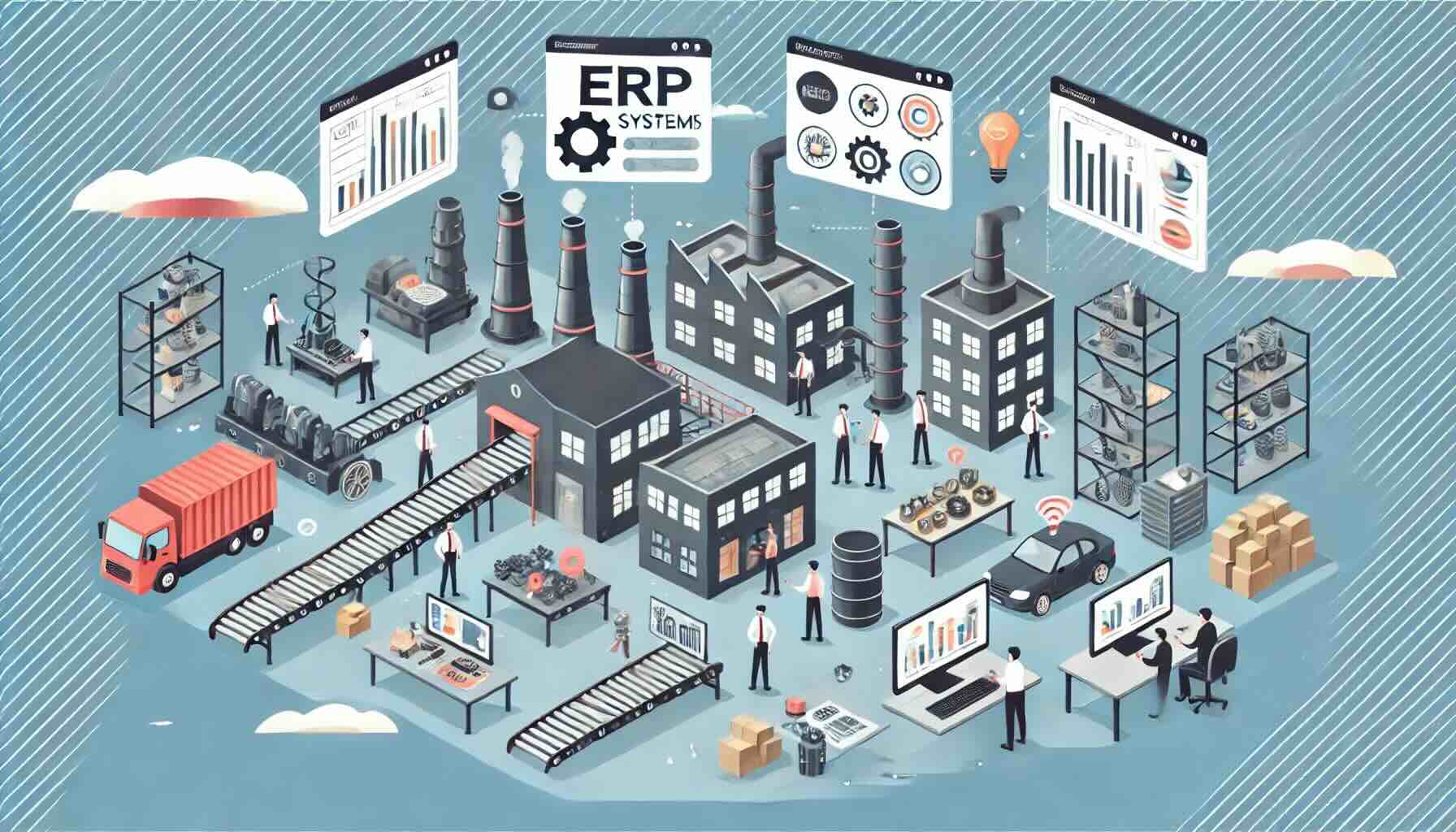Best ERP for Medium-Sized Business: A Comprehensive Guide

Choosing the right ERP (Enterprise Resource Planning) system is crucial for the growth and efficiency of medium-sized businesses. With the market flooded with various ERP solutions, finding the best ERP for medium-sized business needs can be daunting. This guide aims to simplify your decision-making process by highlighting the top ERP systems tailored for medium-sized enterprises, including their detailed pros and cons.
Why Medium-Sized Businesses Need ERP Systems
Medium-sized businesses often face unique challenges, including resource constraints, the need for scalability, and the demand for comprehensive data integration across departments. An effective ERP system addresses these challenges by:
- Streamlining Operations: Integrating various business processes into a single system for better efficiency.
- Enhancing Data Accuracy: Reducing data silos and ensuring real-time data accuracy.
- Improving Decision-Making: Providing critical insights through advanced reporting and analytics.
- Facilitating Scalability: Supporting business growth with scalable solutions.
Top ERP Systems for Medium-Sized Businesses
1. Oracle NetSuite
Oracle NetSuite is a cloud-based ERP solution known for its flexibility and comprehensive suite of applications. It caters to the diverse needs of medium-sized businesses by offering modules for financial management, CRM, e-commerce, inventory management, and more.
- Pros:
- Real-time dashboards and reporting: Provides instant access to key metrics, enabling timely and informed decision-making.
- Advanced financial management: Features robust financial tools, including budgeting, forecasting, and revenue management.
- Robust inventory and order management: Offers comprehensive inventory tracking and order fulfillment capabilities.
- Scalable cloud-based platform: Easily adjusts to business growth without significant infrastructure investments.
- Cons:
- High initial setup costs: Implementation can be expensive, especially for businesses with complex needs.
- Complex implementation and configuration: Requires significant time and expertise to set up correctly.
- Ongoing subscription fees: Continuous costs for using the cloud services, which can add up over time.
2. SAP Business One
SAP Business One is designed specifically for small to medium-sized businesses. It provides a single integrated solution to manage critical business functions, from sales and customer relationships to financials and operations.
- Pros:
- Comprehensive business management capabilities: Covers all essential business processes within one system.
- Real-time data access and analytics: Facilitates quick access to vital business data and insights.
- Customizable to specific business needs: Offers flexibility to tailor the system to unique business requirements.
- Strong industry-specific solutions: Provides specialized solutions for various industries, enhancing relevance and effectiveness.
- Cons:
- Steeper learning curve: Users may require extensive training to fully utilize the system.
- Higher upfront investment: Initial costs can be significant, particularly for businesses with limited budgets.
- Limited scalability for very rapid growth: May not accommodate extremely fast-growing companies as effectively as other solutions.
3. Microsoft Dynamics 365 Business Central
Microsoft Dynamics 365 Business Central is an all-in-one business management solution that’s easy to use and adapt. It connects finance, sales, service, and operations to streamline business processes and improve customer interactions.
- Pros:
- Seamless integration with other Microsoft products: Works well with Office 365, Azure, and other Microsoft tools, enhancing productivity.
- Intuitive user interface: User-friendly design minimizes the learning curve and boosts adoption.
- Advanced reporting and analytics: Powerful tools for generating detailed reports and insights.
- Customizable to industry-specific needs: Can be tailored to meet the specific requirements of various industries.
- Cons:
- Expensive for smaller medium-sized businesses: Costs can be prohibitive for businesses on the lower end of the medium-sized spectrum.
- Additional licenses for some features: Some functionalities may require purchasing extra licenses, increasing overall costs.
- Time-consuming implementation: Deployment can be lengthy, requiring careful planning and execution.
4. Odoo
Odoo is an open-source ERP that offers a suite of applications tailored to meet the needs of medium-sized businesses. Its modular approach allows businesses to start with what they need and scale up as they grow.
- Pros:
- Wide range of integrated business applications: Provides comprehensive tools for various business functions, from CRM to manufacturing.
- Open-source flexibility: Allows for significant customization to fit specific business processes.
- User-friendly interface: Designed for ease of use, encouraging quick adoption.
- Cost-effective and scalable: Lower upfront costs and scalable as the business grows.
- Cons:
- Limited support for complex customizations: While flexible, extensive customizations can be challenging and may require expert developers.
- Additional modules for full functionality: May need to purchase extra modules to cover all business needs, leading to hidden costs.
- Inconsistent community support: Open-source nature means support quality can vary, relying on community and third-party providers.
5. Infor CloudSuite
Infor CloudSuite is a cloud-based ERP solution that delivers deep industry-specific capabilities. It’s designed to meet the unique needs of medium-sized businesses across various sectors.
- Pros:
- Industry-specific functionalities: Tailored features for different industries, enhancing relevance and effectiveness.
- Advanced analytics and AI capabilities: Leverages AI and analytics to provide valuable business insights.
- Flexible deployment options: Can be deployed on the cloud, on-premise, or in a hybrid environment.
- Comprehensive suite of applications: Covers a wide range of business needs, from HR to supply chain management.
- Cons:
- Higher cost for advanced features: More sophisticated capabilities come with a higher price tag.
- Complex implementation: Deployment can be challenging and time-consuming, requiring expert assistance.
- Extensive training for users: Users may need significant training to fully utilize all features and functionalities.
Choosing the Best ERP for Your Medium-Sized Business
When selecting the best ERP for medium-sized business, consider the following factors:
- Business Needs: Identify your business processes and pain points that need addressing.
- Scalability: Ensure the ERP can grow with your business.
- User-Friendliness: Choose an ERP with an intuitive interface and ease of use.
- Integration Capabilities: Ensure the ERP integrates well with your existing systems.
- Cost: Consider the total cost of ownership, including implementation, licensing, and maintenance.
Conclusion
Finding the best ERP for medium-sized business is a critical decision that can significantly impact your business’s efficiency and growth. Oracle NetSuite, SAP Business One, Microsoft Dynamics 365 Business Central, Odoo, and Infor CloudSuite are among the top contenders, each offering unique features, pros, and cons. Carefully assess your business needs and choose an ERP system that aligns with your strategic goals.
By investing in the right ERP solution, medium-sized businesses can streamline their operations, improve data accuracy, enhance decision-making, and support scalability, paving the way for sustained growth and success.
To compare these ERP solutions and many more, you can use our new AI-powered Compare ERP tool. It’s free to use and you get a guaranteed discount on your first year’s licence fees with a referral from Compare ERP.









